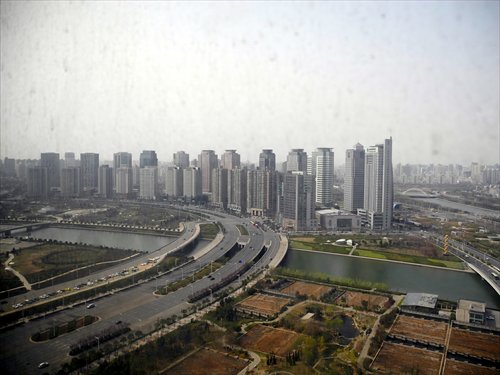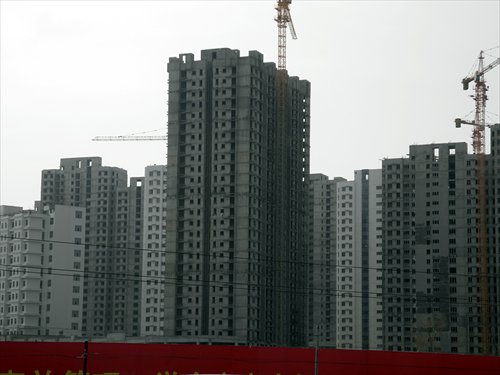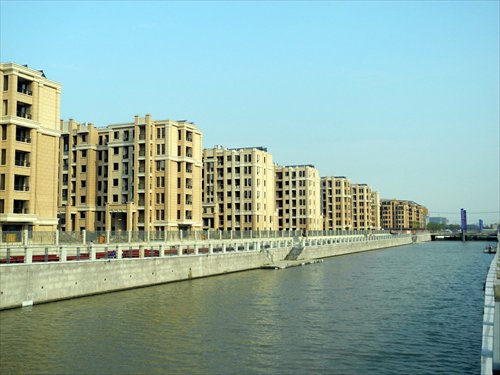Ghost cities: frightening failures or investments in China’s future?

Some of the ghost cities Wade Shepard has found across China. Photo: Courtesy of Wade Shepard

Some of the ghost cities Wade Shepard has found across China. Photo: Courtesy of Wade Shepard
For several years, the phenomenon of China's ghost cities - idle property developments void of inhabitants - has been a hot topic among Western journalists and Sinophiles, many of whom view the country's rapid urbanization as unsustainable. But the author of a new book showed up in Shanghai recently to dispel, what he says is, a popular misconception about these empty cities.
Wade Shepard recently spoke to the Royal Asiatic Society (RAS) in Shanghai, a historical study group established here in 1857 which convenes several times a month for lectures, to discuss his book, Ghost Cities of China (Zed Asian Arguments, 2015), and share haunting stories about these unhaunted cities.
Shepard, a heavily-tattooed New Yorker whose easy laugh offsets his intimidating tribal appearance, is based in Xiamen but spent several years traveling to provinces across China in search of ghost cities, often sleeping in tents because of the complete lack of services and facilities in these undeveloped areas.

Some of the ghost cities Wade Shepard has found across China. Photo: Courtesy of Wade Shepard
In Shanghai, Shepard said he found the greatest concentration of ghost cities of anywhere in China, part of the local government's 20-year master plan, dubbed "1-9-6-6," to expand Shanghai's boundaries into the surrounding countryside.
Many of these new outposts were designed as European-themed utopias, with audacious names like German Town and Thames Town, intended to lure "high-resource-consuming" middle-class masses away from Shanghai's crowded core. But prospective colonists didn't take the bait, and years later these faux-suburban villas still remain vacant.

Wade Shepard author of Ghost Cities of China
As Shepard told the Global Times: "Shanghai is one of the best places in the world to study the urban phenomenon. It was the first city in China to engage in the new urbanization movement, and then the first city to branch out and seed the outskirts with new satellite cities. You see a lot of experimentation in suburbanization here.
"But currently developers are having a difficult time populating these properties, and part of the cause of that is because the central and local governments have taken massive measures to cool down the housing market. Combined with the general economic slowdown, this has had an impact on the number of people who are looking to buy new properties.
"It has also made people more cautious - and conscious - about how they spend their money. But the general thinking is that property will always be a secure investment, prices will always go up. There has always been a big push to buy property in Shanghai, because it's the economic center of China.
"It's a kind of status thing, everyone wants a Shanghai address. So these new developments have been built to accommodate that demand, because even though they are far out in the countryside, it's still technically 'Shanghai.'"
Shepard said his aim was not to portray ghost cities as the epic failures of overly-ambitious property developers, as US media such as 60 Minutes have, but as investments into China's future - "seeds of modernity" intended to meet the nation's inevitable demand for housing.
It might not be this year, nor this decade, nor even this generation, but as Shepard reminded us, no civilization in the history of the world has ever been built and populated in a day.
Nonetheless, some expatriates in the 50-strong RAS audience remained unsure about China's emerging markets when they spoke with the Global Times after Shepard's speech to discuss trends in Shanghai's real estate boom and share predictions about the country's growth.

Nora Wuttke, architect, Germany
I work in urban planning in Shanghai, and what I've learned is that urban planning here is not about the people, it's only about the math - the GFA (gross floor area). There is a huge need for housing here, but unfortunately if you ask Chinese developers what people want to buy, they say they don't care, they will build what they want to build. But what I found most shocking from Wade's lecture is the fact that universities and students are being moved out into the new zones. What kind of innovation and critical thinking can be learned out there? They are being stifled by these environments.
The Western cities have very beautiful environments that inspire us, but these new cities … I would even question if they are "cities" because urbanity is more than the sum of its buildings. It's impossible to predict what will happen because nothing here is linear.

Liz, researcher, the UK
China is the most visual place I have ever photographed. I conducted a project that took me to the ends of every metro line in Shanghai, so I've seen these new developments. I find them quite scary. The lack of public resources and social services - you wonder how anyone can live there. And the lack of environmental life - the promotional plans are always very nice and green, but in reality there are no trees out there. Also, the materials that are being used are so cheap; really these cities aren't meant to last very long.
Those properties have been left to turn to rubble, and people will have to reinvest even more money in them to make them habitable again. But then again, how can we as Westerners put any expectations on China when this isn't happening anywhere else in the world? There's nothing to compare it to - we can learn from everything that is happening here.

Susie Gordon, writer, England
I'm personally very interested in cities and their development, from an anthropological and sociological viewpoint they say a lot about where a nation is heading.
In China we can see that quite sharply because it is a nation that is literally being built - its modern iteration has only existed for 30 years. The Western notion of "ghost towns" are cities that were built, thrived, then fell, but in China ghost cities are a nascent concept. People will move in - it's nothing to despair about. As long as there are people migrating from rural areas to urban areas, there will be a pace. I can't imagine anyone will move back to rurality. That just doesn't happen, so this urbanization boom is bound to continue.